January 12, 2022
IGrain’s Rahul Chauhan provides information on pricing and current inventories, as well as import figures and news from domestic and international markets.


Highlights from the past week:
No major ups and downs in the market
Mumbai
Urad dal prices remained normal last week as demand for urad dal remained normal. Chennai prices registered an improvement of Rs. 50 per quintal due to increased demand; FAQ (Fair Average Quality) was traded at Rs. 6,250 and SQ (Special Quality) at Rs. 6,725 per quintal at the weekend.
Similarly, Mumbai prices also improved by Rs. 50 and, with this jump, FAQ sold at Rs. 6,425/6,450 and new crop sold at Rs. 6,525/6,550 per quintal at the weekend.
In Kolkata, prices remained stable at Rs 6,450 per quintal. Last week, the market fluctuated at a rate of Rs. 50.
Burma
Burma prices recorded a rise of $ 15/ton due to improved demand and prices of FAQ rose to $800/ton and SQ to $ 885/ton over the weekend.
Delhi
Delhi prices for FAQ urad registered an increase of Rs. 100 and SQ improved by Rs. 50 per quintal, supported by a jump in prices at different ports. By the weekend, FAQ prices rose to Rs. 6,650 and SQ to Rs. 7,150 per quintal.
Maharashtra
Due to lack of demand, Maharashtra prices did not see any bullish trend and at the weekend, Latur traded at Rs. 4,000/7,300, Akola Rs. 6,850, Barshi Rs. 3,900/6,300 Ahmednagar Rs. 4,300/7,300, Jalgaon- Madhya Pradesh Line at Rs. 6,600 and Maharashtra remained stable at Rs. 7,150.
Uttar Pradesh
Last week, an improvement in demand was seen, resulting in a bullish movement. Bareilly prices increased by Rs. 200 to Rs. 6,800 and Bahjoi and Bilsi both increased Rs. 200 per quintal to Rs. 6,500.
Rajasthan|Demand improved and prices recorded a rise of Rs. 100 per quintal. With this improvement, the price of Jaipur rose to Rs. 5,400/6,900, Sumerpur to Rs. 6,000/6,500 and Kekadi to Rs. 4,700/6,500 per quintal.
Madhya Pradesh
Last week due to heavy rains and hailstorm, the arrival of urad in the mandis was hindered. Even after short arrivals, there was no specific movement in the state due to sluggish demand and prices remained stable at Rs. 3,500/5,600 in Ashoknagar, in Bina at Rs. 1,800/6,000 and in Ganjbasoda at Rs. 2,500/6,000 per quintal
Others
Due to weak subscription, Vijayawada prices fell by Rs. 100 per quintal. Polished urad at Vijayawada fell to Rs. 7,000 per quintal and Desi to Rs. 6,800. Rajkot prices saw no movement and traded at Rs. 5,000/7,000 per quintal over the weekend.
Urad dal
Demand for urad dal remained weak and no sharp changes were seen in prices. At the weekend, Delhi urad dal traded at Rs. 8,300/9,600, Bhatpara at Rs. 8.800/9,100, Jalgaon at Rs. 8,900 and Meerut at Rs. 6,700/7,700 per quintal.
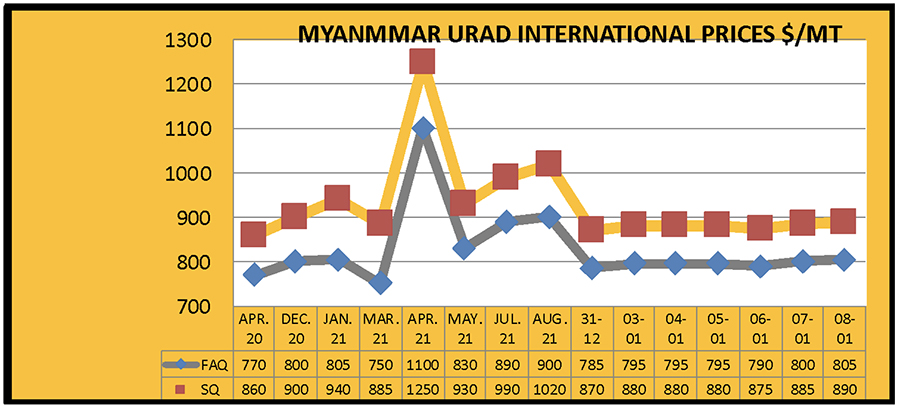
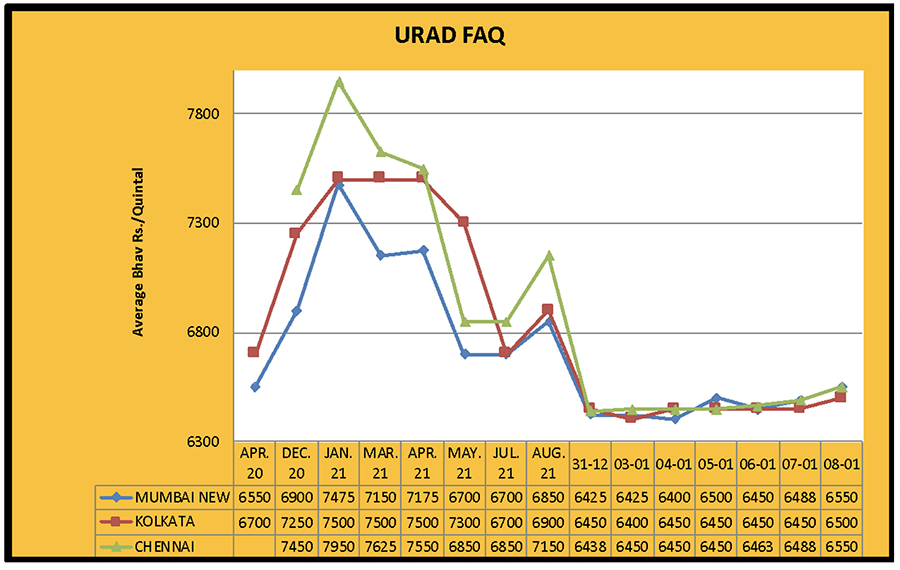
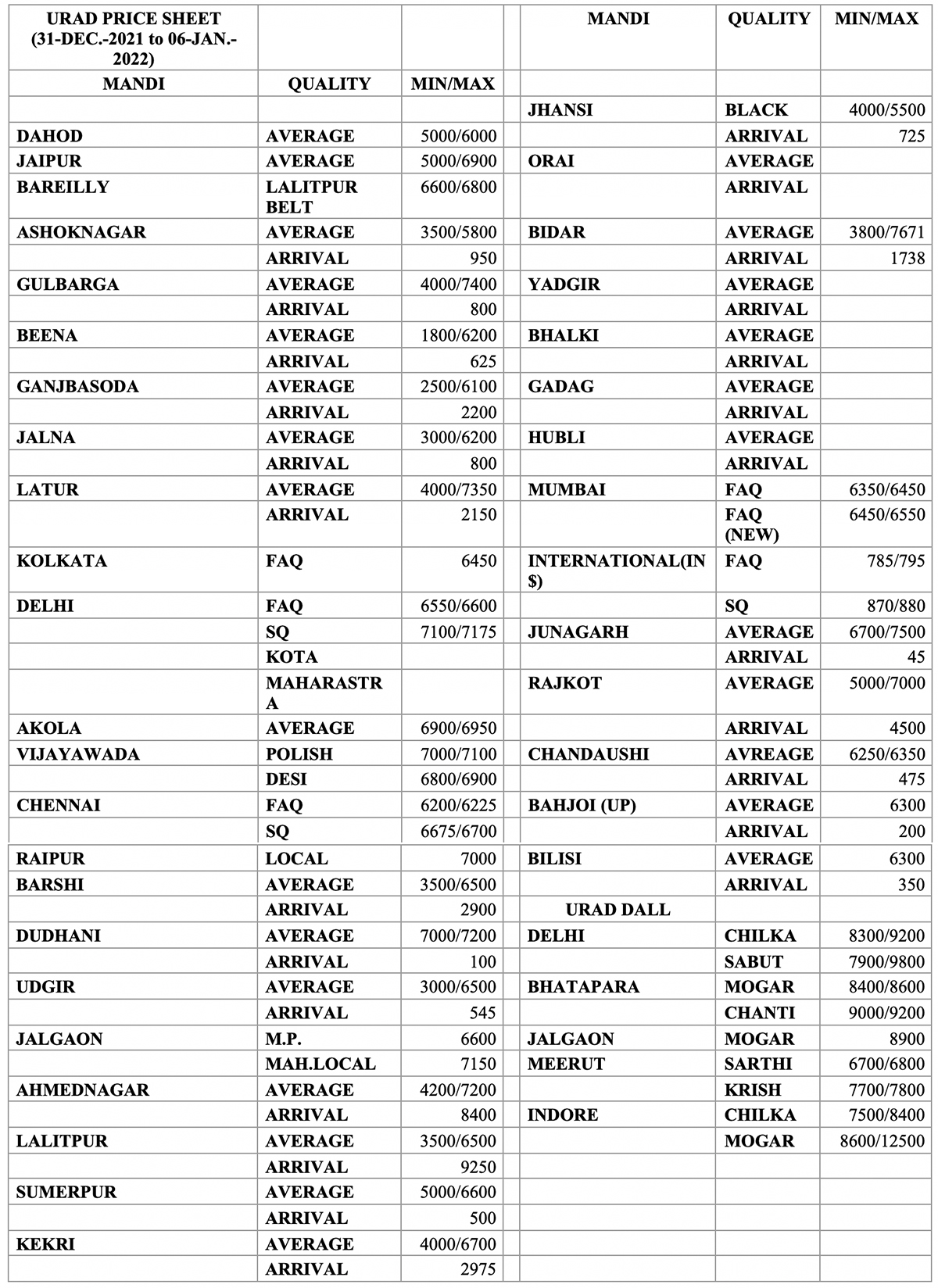
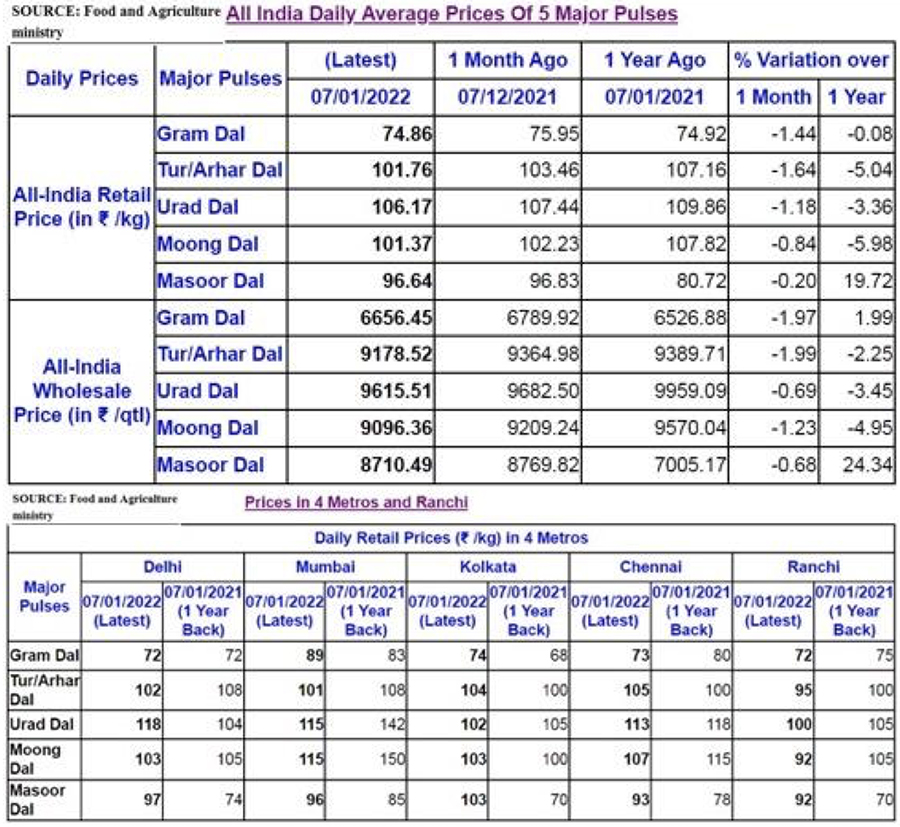
(January 3, 2022)
Agriculture credit target likely to be increased in the upcoming budget
New Delhi. The central government is likely to increase the agricultural credit target to around Rs. 18 lakh crores in the general budget for the financial year 2022-23 so that the pace of development of the agriculture sector can be accelerated further.
The General Budget will be presented in Parliament on February 1, 2022. For the current financial year 2021-22, the government had set a target of Rs 16.50 lakh crore of loan disbursement for the agriculture sector. The agricultural credit target is being increased every year.
According to official sources, the target may be increased to between Rs. 18. and 18.5 lakh crore for the next financial year. Agricultural credit includes the target of crop loans.
Interestingly, the disbursement of agricultural credit has been exceeding the target for the last several years. For example, in the financial year 2017-18, the target was set at Rs. 10 lakh crore, while the actual disbursement amount was Rs 11.68 lakh crore. In 2016-17, against the fixed target of Rs. 9 lakh crores, the total disbursement stood at Rs. 10.68 lakh crores. This credit has become a powerful medium for better agricultural production. The rate of interest on this remains low and is sometimes waived. An agriculture loan of up to Rs.3 lakh usually has an annual interest rate of 7 percent but if the farmer pays the principal loan within the stipulated time period, then a concession of 3 percent is provided in the interest rate. Due to this, farmers have to pay interest only at the rate of 4 percent. More efforts are being made to give loans to small and marginal farmers.
Recent rains cause more damage to Rabi crops
New Delhi. The Meteorological Department has recorded heavy rains and hailstorms in isolated places in Punjab, Haryana, Chandigarh, Delhi, North Rajasthan and West Uttar Pradesh on January 5 and 6, which caused damage to Rabi crops. Rainfall in many parts of Maharashtra, Madhya Pradesh, Rajasthan and Gujarat last week benefited crops but, in many areas, there are reports of torrential rain accompanied by strong winds and damage due to hail.
There were heavy hailstorms in Jaisalmer, Rajasthan, which accumulated for several kilometers. Along with this, heavy rain was also reported in Jodhpur, Bhilwara, Kota, Baran and some other districts including in Jabalpur, Madhya Pradesh. There are reports of water logging in fields in the low-lying areas of the above states, which is also harmful for Rabi crops.
In areas with normal rainfall, crops have benefited rather than been harmed. There is preliminary information about damage to Rabi crops in about 20,000 hectares due to the hailstorms.
In the Amravati district of Maharashtra, where crops include fruits and vegetables along with gram, wheat and tuar, the weather conditions have remained more or less favorable for Rabi crops but this is likely to change. The sowing area of wheat has decreased compared to last season, while that of mustard and lentils has increased. There is uncertainty about the total sown area of gram: government figures are showing an increase but, in reality, the area is likely to decrease somewhat. The acreage of peas has decreased.
Weather conditions in other major producing states, including Uttar Pradesh, Haryana, Madhya Pradesh and Gujarat also need to be monitored.
(January 5, 2022)
Turkey extends duty-free import of some agricultural products
Ankara. The period of duty-free import of commodities including wheat, gram, lentils, barley, oats and rye in Turkey has been extended for one year, until the end of 2022. Apart from this, sunflower oil can be imported duty-free until the end of June 2022.
It is worth mentioning that some products are imported into Turkey for domestic use as well as for export purposes. For example, wheat is heavily imported from Russia and Ukraine and milled there before being exported to the neighboring countries of West Asia and Africa. Similarly, there is a good export of lentils from Turkey, which also heavily imports from Canada, Russia and Australia. Turkey also exports sunflower oil and imports sunflowers from Ukraine and Russia to be processed. The extension of the duty-free import period by one year will bring great relief to Turkish importers and millers as the prices of wheat and lentils have risen to very high levels in the global market. The deadline for duty-free imports was due to expire in December 2021 but, before that, an official announcement was made to extend it. In India, sunflower oil is imported on a large scale from Ukraine and Russia and lentils from Canada, Russia and Australia.
Omicron's dark shadow on Indian Marriages.
New Delhi. According to rough estimates, between January and March 2022, there is expected to be 3 million marriages in India but, due to the ongoing spread of COVID-19, particularly the new Omicron variant, the government has had to reduce the number of people participating in the celebrations.
The people of India have begun postponing marriages and functions and a decrease in demand for pulses is predicted, as events may be canceled or attended by fewer people. Typically for Indian marriages, there is a huge demand for many food products including basmati rice, edible oil, sugar, pulses and spices.
New rules and controls are being announced for wedding ceremonies in many states. It is worth noting that about Rs 4 lakh crore worth of business is typically generated from 30 lakh wedding ceremonies but, due to various regulations, this will likely decrease.
The General Secretary of the Confederation of All India Traders (CAT) says that wedding revenue may now decrease to around Rs 1.50 lakh crore. Traders have already made the necessary preparations for the matrimonial season, including gathering sufficient stocks of various essential food items. The matrimonial season will run from January 14 to March 31 and there will be 17 major Muhurtas (auspicious days) during this period. As a result of this, venues have already been booked in advance; now, however, there is the possibility of a big setback to the events.
The number of wedding participants has been fixed at 50 in Maharashtra and West Bengal and 100 in Rajasthan. The rules are very strict in Delhi with 20 people allowed to participate in the wedding, which must take place at home or in the court. Similar strict rules are being implemented in other states as well. According to the reviewers, at least for January there will be a lot of regulations imposed on weddings but the situation will be reviewed throughout the period.

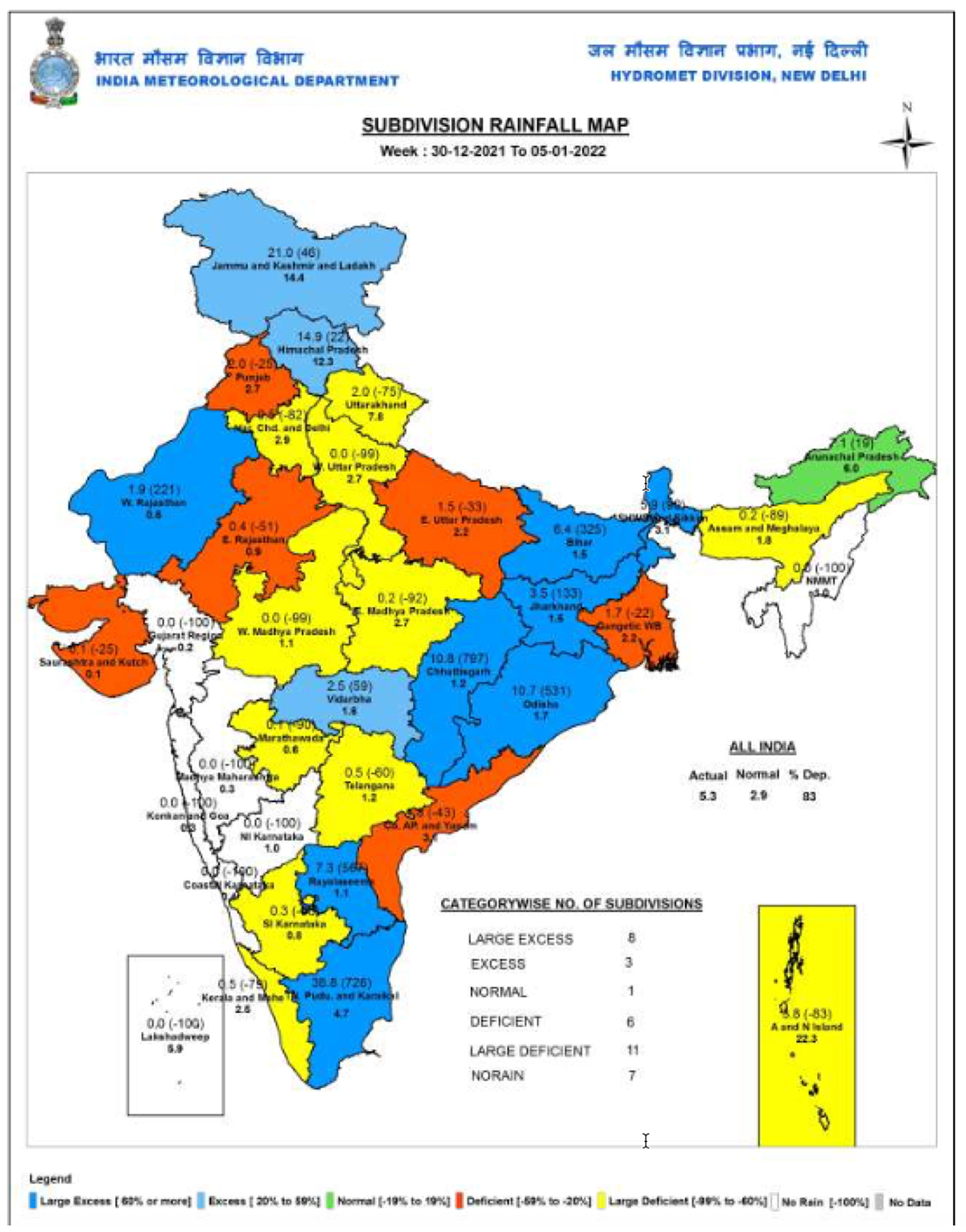
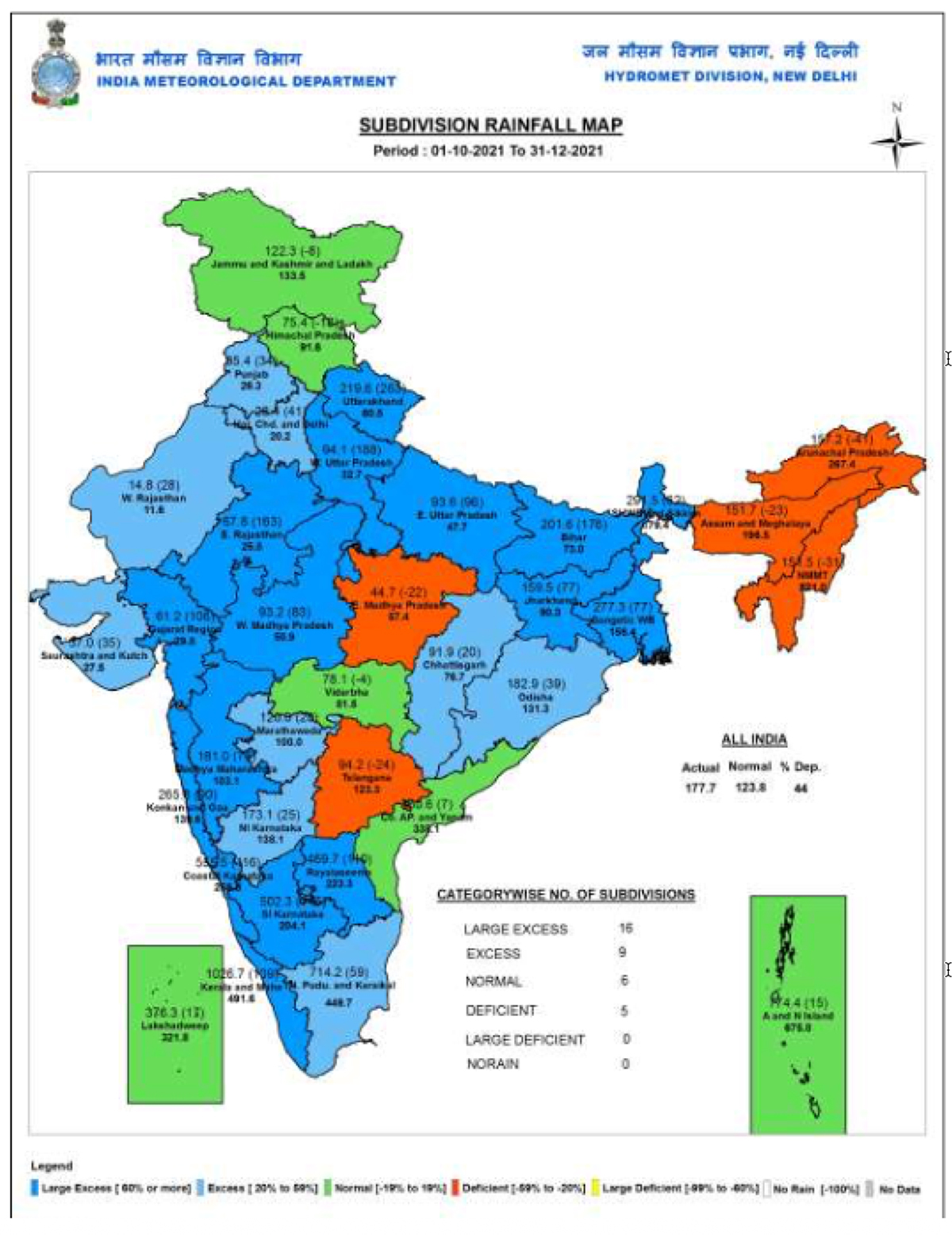
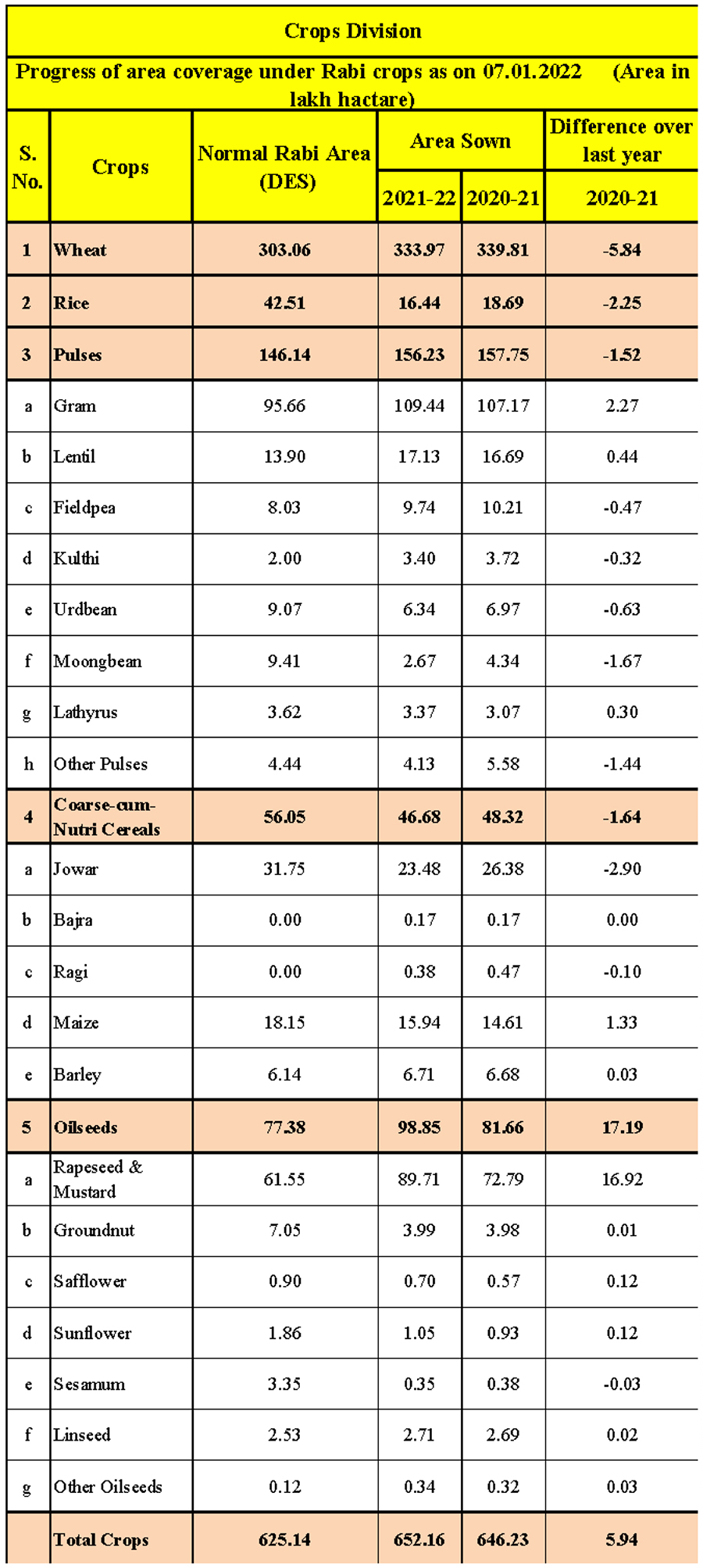


Abbreviations
Tuar/ Arhar: Pigeon Peas PP
Mung: Green Mung
Urad: Black Matpe
Chana: Gram, Desi Chickpea
Matar: Pea
Masur: Lentil
Besan: Gram Flour
Mandi: Market yard
Bhav: Prices
Dal/Daal: Processed Pulses (Directly for human consumption)
Rs: Indian Rupees (1$=Rs 73.8) 12 Jan. 22 at 08:46 PM IST
Rahul Chauhan
Director, IGrain India
igrainind@gmail.com
+91 9350141815
Twitter igrain_india

IGrain / Rahul Chauhan / India / Mumbai / Burma / Delhi / Maharashtra / Uttar Pradesh / Rajasthan / Madhya Pradesh / Pigeon pea / Desi Chick peas / Mung / Lentil / Black Matpe
Disclaimer: The opinions or views expressed in this publication are those of the authors or quoted persons. They do not purport to reflect the opinions or views of the Global Pulse Confederation or its members.